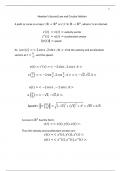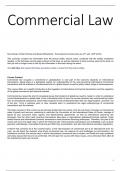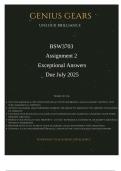Lecture 1 – introduction to commercial law
Introduction to commercial law
- What do you need to know about (transnational) commercial law generally?
1. Nature of commercial law
2. The historical development of transnational commercial law
3. Sources of (transnational) commercial law
1. Nature of commercial law
What drives commercial law?
Commercial law derived from the practices and needs of merchants to uphold transactions.
As a result of survive business competition on one hand and also the need to overcome
trade impediments, merchants incur to uphold transactions. These transactions should be
widespread. However, because they are so widespread, there are high costs to invalidate
them.
The nature of commercial law
- Body of law that governs commercial transactions
- What are commercial transactions?
1. According to Roy Goode, they are arrangements and agreements between
professionals for the provisions and acquisition of goods, services, and
facilities in the way of trade
Four key characteristics of commercial law
Focus on Excluded from a commercial code
Transactions Law governing institutional structures
Dealings between merchants Consumer law
Centered upon contracts and Legal obligations from non-contractual source
use of market
Large mass of transactions Occasional transactions with no need of
standard treatment
,What is to be put in a commercial code? In civil law there is a commercial law code. In
Anglo-American systems, there is not. If we don’t have a commercial law code, what can we
put into that code? What sort of laws? And if we do have such a code, can we understand it
as only the transactions and laws involved in such a code can be called or named as
commercial law?
What is the so-called commercial law? Look at the table.
Examples of typical commercial transactions
- Carriage of goods
- Distributorship
- Warehousing
- Insurance
- Equipment leasing
- Receivables financing
2. The development of transnational commercial law
The evolution of medieval law of merchant
Commercial law had a transnational nature historically!
Characteristics of medieval law of merchant
Qualities Shortcomings
Objectivity Not an organized body of law but a
- from usage to defined customary law disparate assortment of customary rules
Universality Varies from place to place
- transnational in nature
Reciprocity of rights
- Procedural and substantive fairness in
exchange
Participatory adjudications
- Merchants select judges
Coherence and integrated body of rules
Organic growth of commercial instruments
and institutions
,Nationalization of commercial law
- Desire of central courts to expand jurisdiction
- Rise of modern nation state and elaboration of law codes
o Rise of national laws governing international trade (thus declining role of law
of merchant)
o Narrowing of legal education
o Growth of conflict-of-laws rules to determine cases with foreign elements
Commercial law was actually born with an international nature. However, it has gone
through a period of nationalization. This is due to the rise of modern nation states and
elaboration of law of codes. Rise of legal education and growth of conflict-of-laws allows
party to determine applicable law for their transactions.
Return to internationalism and growth of transnational commercial law
- Second half of 19th century – beginning 20th century
- Growing recognition that international commercial transactions are different than
domestic ones
- Diversity and inadequacy of national legal systems give rise to uncertainty
• Different laws, practices, and expectations over the same concept
• Conflict of laws rules do not solve these differences
- These differences gave rise to efforts of harmonization of commercial law
Benefits and problems with harmonization
- Benefits
- Problems
o Many international private law conventions remain unsuccessful
3. Sources of (transnational) commercial law
Sources of (transnational) commercial law
A. Contracts
a. Standard contracts
b. Contractually incorporated rules and trade terms
B. Law of merchant (lex mercantoria) / trade customs and usages
,C. General principles of law
D. National legislation and case law
E. International and regional documents
a. Conventions (instruments intended to be legally binding)
b. Model laws and rules (facultative instruments)
F. Restatements of scholars
A. Contracts: What about ‘’contract makes law’’?
- Party autonomy: what the parties agree will be
o Binding on them, and
o Respected by courts or arbitral tribunals
- The validity of contractual provisions normally does not become an issue unless
o A party challenges it, or (if a party challenges it, then we need the court to
speak over its validity)
o It raises a public policy issue
- Thus, within the framework of external legal norms people can make their own law
A. Standard form contracts
- Standard contracts as a legal norm can be a debatable statement
o In real life there are many standard contract terms and terms providers
o Can be an oversimplification of real situation
o Lack concrete criteria
A. Contractually incorporated non-binding rules promulgated by international
organizations
- International trade terms, like INCOTERMS, UCP600
- Take effect when incorporated into the contract
o Help to facilitate uniformity of practices
o Need to be consistent with the terms of the contract
B. Customs and usages
- Lex mercatoria as unwritten customs and usages of merchants
o Custom: a rule which has obtained the force of law in particular locality
o Usage: settles practice of a particular trade or profession
- Consistently adopted commercial practices can be a factual situation indicative of a
legal norm
o Example: the letter of credit binding upon issue
- The central question: when can a usage be legally operative?
o By its mere existence (thus practices make law)?
o After the validation of certain external criteria?
B. The normative force of usages
- A usage needs to be normative
o Burden lies on those alleging the existence of such custom and usage
o But mere existence of a usage is not enough
- Certain external criteria of validity must be there in order for a usage to become a
legally binding obligation
, o External validation by a court or arbitral tribunal
o Court or arbitral tribunal make determination in accordance with law
B.Two stages of evolution of a trade practice into a legally binding usage
- 1. Establishment of the practice by mercantile community
o Failure of observe it will lead to commercial but not legal sanctions
o Own law of the business community
- 2. The practice will be recognized in law through dispute resolution
o Court or arbitral tribunal decides
B.Important characteristics of custom and usage
- Courts may incorporate a trade custom or usage into a contract when:
o It is reasonable: it is fair, proper and reasonable, so honest and right-minded
men would adopt
o It is well known
o It is consistently adopted
o It is lawful
▪ Must not be inconsistent with the terms of contract, express or
implied
▪ Must be distinguished from mere market practice
▪ The practice needs to be adopted from a sense of binding obligation,
instead of merely courtesy or convenience
C. General principles of law (tb. Page 43)
- Usage can become a general principle of law when it:
o Gains general acceptance
o Can be applied independently
- Examples:
o Agreement must be kept (pacta sunt servanda)
o Good faith
o Party cannot rely on failure of a condition precedent caused by its own non-
performance
D. National legislation and case law
- Conscious or unconscious judicial or legislative parallelism
o Courts or legislative bodies of one state may consciously borrow ideas
developed in other states; or
o They may unconsciously arrive at broadly the same result
E. Multilateral treaties and conventions
- The focus of our book
- Measures for determining appropriateness and success of these treaties and
conventions
o Large number of ratifications
o Rapidly growing body of case law (so that merchants do make use of the
conventions)
, E.Facultative instruments (=not directly by themselves legally binding)
- Model laws
o National legislatures are free to decide to make use of it or not, in whole or in
part
o States can adopt the whole draft
o States can also borrow certain rules and provisions as a source of ideas for
domestic legislation
F. Restatements by scholars
- The purpose
o Identify and adapt to modern conditions the best rules from different
systems and thereby secure harmonization and improvement of law
- Addressed to national legislatures
- Helpful and influential in develop jurisprudence in the legal areas they touch
- Examples: restatements of contract law
G. Nature of transnational commercial law
- The big question: is there an autonomous transnational commercial law?
- It is fair to say that transnational commercial law:
o Is a set of legal norms not based on any legal system but derived from a
variety of sources
o Is a move away from national laws determined by conflicts rules
o Supplements a national legal system
o But transnational commercial law does NOT replace it!
- Thus, there is no autonomous transnational commercial law
- Transnational commercial law should be defined by its sources, not by
G.No autonomous transnational commercial law
- lex mercatoria typically cannot be selected as the applicable law
o Conflict of laws rules normally pertain to choices of “national laws”
- Rules of transnational commercial law are not necessarily different from, but are
drawn upon and complementary to, those of national laws
- Principles and rules of lex merchatoria are of a normative character
o Not simply because they are reasonable or fair
o But because they have been validated by a court or arbitral tribunal in
accordance with certain legal norms
G.Harmonization of transnational commercial law
- Instruments of harmonization
o Multilateral treaties and conventions
o Facultative documents
o Contractually incorporated non-binding rules promulgated by international
organizations
o Best practice guides and legislative guides
o Restatement of scholars
→ dialogue of sources altogether serve the end of harmonization
Introduction to commercial law
- What do you need to know about (transnational) commercial law generally?
1. Nature of commercial law
2. The historical development of transnational commercial law
3. Sources of (transnational) commercial law
1. Nature of commercial law
What drives commercial law?
Commercial law derived from the practices and needs of merchants to uphold transactions.
As a result of survive business competition on one hand and also the need to overcome
trade impediments, merchants incur to uphold transactions. These transactions should be
widespread. However, because they are so widespread, there are high costs to invalidate
them.
The nature of commercial law
- Body of law that governs commercial transactions
- What are commercial transactions?
1. According to Roy Goode, they are arrangements and agreements between
professionals for the provisions and acquisition of goods, services, and
facilities in the way of trade
Four key characteristics of commercial law
Focus on Excluded from a commercial code
Transactions Law governing institutional structures
Dealings between merchants Consumer law
Centered upon contracts and Legal obligations from non-contractual source
use of market
Large mass of transactions Occasional transactions with no need of
standard treatment
,What is to be put in a commercial code? In civil law there is a commercial law code. In
Anglo-American systems, there is not. If we don’t have a commercial law code, what can we
put into that code? What sort of laws? And if we do have such a code, can we understand it
as only the transactions and laws involved in such a code can be called or named as
commercial law?
What is the so-called commercial law? Look at the table.
Examples of typical commercial transactions
- Carriage of goods
- Distributorship
- Warehousing
- Insurance
- Equipment leasing
- Receivables financing
2. The development of transnational commercial law
The evolution of medieval law of merchant
Commercial law had a transnational nature historically!
Characteristics of medieval law of merchant
Qualities Shortcomings
Objectivity Not an organized body of law but a
- from usage to defined customary law disparate assortment of customary rules
Universality Varies from place to place
- transnational in nature
Reciprocity of rights
- Procedural and substantive fairness in
exchange
Participatory adjudications
- Merchants select judges
Coherence and integrated body of rules
Organic growth of commercial instruments
and institutions
,Nationalization of commercial law
- Desire of central courts to expand jurisdiction
- Rise of modern nation state and elaboration of law codes
o Rise of national laws governing international trade (thus declining role of law
of merchant)
o Narrowing of legal education
o Growth of conflict-of-laws rules to determine cases with foreign elements
Commercial law was actually born with an international nature. However, it has gone
through a period of nationalization. This is due to the rise of modern nation states and
elaboration of law of codes. Rise of legal education and growth of conflict-of-laws allows
party to determine applicable law for their transactions.
Return to internationalism and growth of transnational commercial law
- Second half of 19th century – beginning 20th century
- Growing recognition that international commercial transactions are different than
domestic ones
- Diversity and inadequacy of national legal systems give rise to uncertainty
• Different laws, practices, and expectations over the same concept
• Conflict of laws rules do not solve these differences
- These differences gave rise to efforts of harmonization of commercial law
Benefits and problems with harmonization
- Benefits
- Problems
o Many international private law conventions remain unsuccessful
3. Sources of (transnational) commercial law
Sources of (transnational) commercial law
A. Contracts
a. Standard contracts
b. Contractually incorporated rules and trade terms
B. Law of merchant (lex mercantoria) / trade customs and usages
,C. General principles of law
D. National legislation and case law
E. International and regional documents
a. Conventions (instruments intended to be legally binding)
b. Model laws and rules (facultative instruments)
F. Restatements of scholars
A. Contracts: What about ‘’contract makes law’’?
- Party autonomy: what the parties agree will be
o Binding on them, and
o Respected by courts or arbitral tribunals
- The validity of contractual provisions normally does not become an issue unless
o A party challenges it, or (if a party challenges it, then we need the court to
speak over its validity)
o It raises a public policy issue
- Thus, within the framework of external legal norms people can make their own law
A. Standard form contracts
- Standard contracts as a legal norm can be a debatable statement
o In real life there are many standard contract terms and terms providers
o Can be an oversimplification of real situation
o Lack concrete criteria
A. Contractually incorporated non-binding rules promulgated by international
organizations
- International trade terms, like INCOTERMS, UCP600
- Take effect when incorporated into the contract
o Help to facilitate uniformity of practices
o Need to be consistent with the terms of the contract
B. Customs and usages
- Lex mercatoria as unwritten customs and usages of merchants
o Custom: a rule which has obtained the force of law in particular locality
o Usage: settles practice of a particular trade or profession
- Consistently adopted commercial practices can be a factual situation indicative of a
legal norm
o Example: the letter of credit binding upon issue
- The central question: when can a usage be legally operative?
o By its mere existence (thus practices make law)?
o After the validation of certain external criteria?
B. The normative force of usages
- A usage needs to be normative
o Burden lies on those alleging the existence of such custom and usage
o But mere existence of a usage is not enough
- Certain external criteria of validity must be there in order for a usage to become a
legally binding obligation
, o External validation by a court or arbitral tribunal
o Court or arbitral tribunal make determination in accordance with law
B.Two stages of evolution of a trade practice into a legally binding usage
- 1. Establishment of the practice by mercantile community
o Failure of observe it will lead to commercial but not legal sanctions
o Own law of the business community
- 2. The practice will be recognized in law through dispute resolution
o Court or arbitral tribunal decides
B.Important characteristics of custom and usage
- Courts may incorporate a trade custom or usage into a contract when:
o It is reasonable: it is fair, proper and reasonable, so honest and right-minded
men would adopt
o It is well known
o It is consistently adopted
o It is lawful
▪ Must not be inconsistent with the terms of contract, express or
implied
▪ Must be distinguished from mere market practice
▪ The practice needs to be adopted from a sense of binding obligation,
instead of merely courtesy or convenience
C. General principles of law (tb. Page 43)
- Usage can become a general principle of law when it:
o Gains general acceptance
o Can be applied independently
- Examples:
o Agreement must be kept (pacta sunt servanda)
o Good faith
o Party cannot rely on failure of a condition precedent caused by its own non-
performance
D. National legislation and case law
- Conscious or unconscious judicial or legislative parallelism
o Courts or legislative bodies of one state may consciously borrow ideas
developed in other states; or
o They may unconsciously arrive at broadly the same result
E. Multilateral treaties and conventions
- The focus of our book
- Measures for determining appropriateness and success of these treaties and
conventions
o Large number of ratifications
o Rapidly growing body of case law (so that merchants do make use of the
conventions)
, E.Facultative instruments (=not directly by themselves legally binding)
- Model laws
o National legislatures are free to decide to make use of it or not, in whole or in
part
o States can adopt the whole draft
o States can also borrow certain rules and provisions as a source of ideas for
domestic legislation
F. Restatements by scholars
- The purpose
o Identify and adapt to modern conditions the best rules from different
systems and thereby secure harmonization and improvement of law
- Addressed to national legislatures
- Helpful and influential in develop jurisprudence in the legal areas they touch
- Examples: restatements of contract law
G. Nature of transnational commercial law
- The big question: is there an autonomous transnational commercial law?
- It is fair to say that transnational commercial law:
o Is a set of legal norms not based on any legal system but derived from a
variety of sources
o Is a move away from national laws determined by conflicts rules
o Supplements a national legal system
o But transnational commercial law does NOT replace it!
- Thus, there is no autonomous transnational commercial law
- Transnational commercial law should be defined by its sources, not by
G.No autonomous transnational commercial law
- lex mercatoria typically cannot be selected as the applicable law
o Conflict of laws rules normally pertain to choices of “national laws”
- Rules of transnational commercial law are not necessarily different from, but are
drawn upon and complementary to, those of national laws
- Principles and rules of lex merchatoria are of a normative character
o Not simply because they are reasonable or fair
o But because they have been validated by a court or arbitral tribunal in
accordance with certain legal norms
G.Harmonization of transnational commercial law
- Instruments of harmonization
o Multilateral treaties and conventions
o Facultative documents
o Contractually incorporated non-binding rules promulgated by international
organizations
o Best practice guides and legislative guides
o Restatement of scholars
→ dialogue of sources altogether serve the end of harmonization












